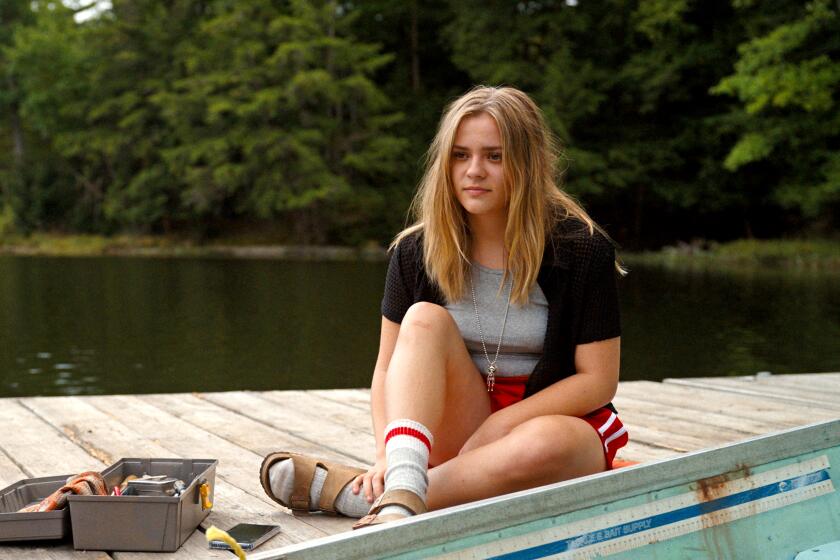Review: In ‘Princess Kaguya,’ a wondrous parable about what matters
“The Tale of the Princess Kaguya” is a marvel of Japanese animation, a hand-drawn, painterly epic that submerges us in a world of beauty. While almost everything about it bespeaks its origins in a culture very different from the West, the delicacy and grace of its sublime imagery create an impact that couldn’t be stronger.
This feature is the first work in 14 years by venerable 78-year-old Isao Takahata, the co-founder, along with the great Hayao Miyazaki, of Studio Ghibli. Takahata has had this film, a parable about what matters in life and what does not, on his mind for 55 years, and its antecedents go back further. Much further.
“Princess Kaguya” is based on a 10th century Japanese folk tale, “The Tale of the Bamboo Cutter,” that is considered perhaps that country’s oldest surviving narrative. Which is why so much about this film, from its cultural references to its leisurely 2 hour and 17 minute pacing, takes us on a journey to a different time and place.
What is universal about “Princess Kaguya” is the stunning way it looks, as if it were a watercolor sketchbook come to life. Takahata and his team have focused on transporting nature imagery, things like rushing streams, joyous birds, the wind moving through a stand of bamboo. Whether experienced in the version dubbed by American actors like Chloë Grace Moretz and James Caan or (much preferably) the Japanese original, this is animation intended for adults as much if not more than children, the kind of film you need to give yourself up to without looking back.
That gorgeous imagery not only looks good, it has thematic importance as well. For one of the things “Princess Kaguya,” the person as well as the film, believes is that the natural world offers the kind of deep satisfactions that the nominally more sophisticated urban landscape can’t hope to match.
Given those folk tale origins, “Princess Kaguya” not surprisingly begins with that hard-working bamboo cutter chopping away in the forest he lives in. Suddenly he spies a bright light emanating from a stalk and, drawing near, sees a tiny, fully formed and carefully dressed individual inside, small enough to fit in the palm of his hand.
The woodcutter brings this miniature being home to his wife, and it promptly turns into a conventional-looking baby girl. “This is strange,” the bamboo cutter says, and that is not the half of it.
For almost everything about this new creature turns out to be magical, including the speed with which she grows. A group of rowdy kids, the children of a neighboring bowl maker, nickname her “Little Bamboo” for that rapid growth. That mightily offends the bamboo cutter, who is so deeply enamored of the creature he discovered that he calls her princess.
This strange girl turns out to be something of a wood sprite, a wild child of nature who finds her greatest pleasure running through the outdoors with the neighborhood gang headed by handsome Sutemaru. Still, even at her happiest, an air of unexplained melancholy hangs over her, a sensibility the film itself shares.
As in many folk tales, the good is fated not to last. One day the bamboo cutter makes another epic discovery in the woods, a bamboo stalk filled with gold, a find that leads him to assume that the gods are mandating a very different life for his charge. She must, he decides, become a wealthy princess in the capital, but even with untold wealth that transition proves problematic.
Forced to leave the only earthly life she’s known, the princess has her hands full remaining her own person as she transitions to a world of empty ritual and hollow tradition. In one stunning sequence, the princess tries to flee this stifling world so rapidly that she outruns her outer clothes and the landscape around her blurs into single brush strokes. This young woman can outrun almost everything except, as it turns out, the destiny written on the wind.
Twitter: @KennethTuran
------------
‘The Tale of the Princess Kaguya’
MPAA rating: PG for thematic elements, violent action, partial nudity
Running time: 2 hours, 17 minutes
Playing: ArcLight, Hollywood
More to Read
Only good movies
Get the Indie Focus newsletter, Mark Olsen's weekly guide to the world of cinema.
You may occasionally receive promotional content from the Los Angeles Times.











